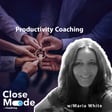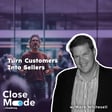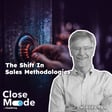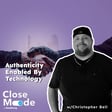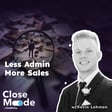Become a Creator today!Start creating today - Share your story with the world!
Start for free
00:00:00
00:00:01

A Deep Dive into Relationship Building w/Dilberth Jimenez
In this episode, Brian Dietmeyer talks to Dilberth Jimenez, a senior sales executive at Tungsten Automation, about the evolving landscape of technology sales and the increasing importance of human relationships in business transactions. They explore how sales strategies have shifted in response to more informed and autonomous customers, emphasizing the need for sales professionals to focus on the human element and build trust. This insightful conversation is a must-listen for anyone interested in understanding the dynamic interplay between technology and human interaction in sales today.
Timestamps:
- 00:02 Introduction to the episode and guest Dilberth Jimenez.
- 00:34 Dilberth Jimenez expresses his excitement about contributing to the podcast.
- 01:24 Dilberth discusses changes in technology sales over the past five years.
- 02:41 Brian and Dilberth delve into how these changes affect sales approaches.
- 03:24 The importance of reputation and personal interaction in sales.
- 06:13 Discussion on the role of technology in enhancing human relationships in sales.
- 10:14 Exploring the influence of thought leaders in the buying process.
- 13:52 Brian shifts the conversation to organizational support for sales teams.
- 16:07 Dilberth highlights the need for simplicity in sales processes to enhance customer experience.
- 22:05 The potential role of AI in improving sales efficiency and effectiveness.
Transcript
Introduction
00:00:04
Speaker
Hello, and welcome to another edition of Close Mode, the enterprise sales show. I'm Brian Deetmeyer, CEO of Close Strong AI, the home of precision guided selling. And today i'm I'm really excited to be with Dilbert Jimenez, who's a senior sales executive at Tungsten Automation. And for those of you who aren't familiar, Tungsten is the trusted leader in intelligent workflow automation, provides to businesses with solutions to automate their most data intensive business workflows. So Dilbert, welcome to the show.
00:00:36
Speaker
Well, thank you for having me. Appreciate it. Excited to be here. So hopefully you can add to your content and add some interesting insight into what we do. yeah Yeah. Yeah. Excuse me.
Market Evolution in Technology Sales
00:00:48
Speaker
we We talked about this a little bit last week that typically we interview like sales and revenue leads and talk about strategic stuff. And lately I've been looking for a different perspective for leaders to hear from what I call frontline warriors. My last book was called B2B Street Fighting. And that's kind of what I want to talk about today is is kind of getting
00:01:06
Speaker
getting out of the clouds and into, you know, what those of us selling on the street are dealing with. So I'm wondering, Dil, both from from a selling perspective, have you seen the market change over the last, say, five years, harder, easier? What kind of shifts, if any, have you seen? For the last five years, I mean, there's been tremendous change in the way that, you know, technology is being sold and and and really how customers are buying their solutions. I think customers have become much more aware and knowledgeable about the products themselves prior to even having the first conversation with a sales executive or or any of the professionals in the sales field.
Understanding Customer Motivations
00:01:50
Speaker
yeah So I think from a
00:01:52
Speaker
coming from my side of the fence, we have to be a lot more aware about the customer themselves, what drives that organization, and then hopefully find ways to understand where the customer or that individual is actually coming from, what motivations they have personally and career-wise that we can help with.
00:02:13
Speaker
And understanding that information has become much more important as things continue to change, right? yeah Especially now that you're having technology changing with AI and customers becoming much more aware of what it can and cannot do. those Those types of conversations really need to be very thoughtful, very strategic with the customer.
00:02:38
Speaker
That it's interesting because you, you kind of led into my next question about like, how, how's that changing your selling
Human Side of Selling in a Data-Driven World
00:02:44
Speaker
approach? And so if I'm hearing you right, but because they're, they're getting the product and technical data themselves that you've put more of a focus on the the human side of selling with, with the buying influence.
00:02:56
Speaker
Absolutely. i'm I'm a big believer in, you know, people buy for people. And I don't, you know, that's always been the case. And I don't think that's going to change, even with technology, the way it's it's going. I think it's going to transform it. I think it's going to improve on that. But at the end of the day, I think customers or prospects are going to want to hear what you have to say. if If you are somebody that is respected and and has a good reputation, they they they're gonna wanna hear what you have to say and what recommendations you have for them. And I think AI is just going to augment that conversation and it's gonna help tremendously in the in the in the end.
00:03:40
Speaker
I wonder how you feel about this. When when I think about relationship and I've written a little bit about this, there there's kind of the ah human
Balancing Human Relationships with Business Needs
00:03:48
Speaker
relationship. In fact, it's funny, I was talking to on a podcast with a ah sales enablement lead the other day and he said, you know, discovery is almost like dating, right? you're You're really getting to know one another and building credibility with one another, which I thought was interesting and and accurate.
00:04:04
Speaker
so but but but i tend to lump this there's kind of that the human relationship side what is still worth you to get to know the human and then the business relationship of understanding needs so when you talk more about the human focus would you say it's biased toward one of those areas or you're executing both. I think if you do it correctly you're not.
00:04:25
Speaker
you're not inserting your bias into it. yeah I think if you're doing it correctly, you are actively listening to what the customer or the prospect gets saying to you and really taking what they're saying and maybe there may there may be some underlying meanings behind what they're saying, but really understanding what they're saying and where they're coming from. And I think that can build their lasting relationship as opposed to trying to figure out a way to direct the conversation for your own benefit.
00:04:51
Speaker
yeah And the customers and prospects see that. And when they see that, they tend to step back. And they take it to kind of, you know, they they kind of pause for a second.
Building Trusting Relationships in Sales
00:05:01
Speaker
And this and whether they do it consciously or subconsciously, they take that pause and they start to kind of question what your motivations are. Is this guy really going to help me and achieve what I need to do for my organization and for me personally? Yeah. or Is this really a a partnership, a relationship that we're building here that we're going to help each other out, right? Because ultimately, yes, it's a business relationship. And you're going to have, you know, hopefully, both sides are going to end up coming up in benefiting from this relationship.
00:05:35
Speaker
But ultimately, I think, from from my perspective as a sales executive, you have to have the insight and the ability to be, to make all of your bias and just really listen to what they want to yeah tell you and what they really need from you. And I think yeah everything else is going to be taken is going to take care of itself, right? The sale itself, the PO o coming in, you're making your call. I think that ultimately will take care of it if you are really focused to what's important, which is What does the customer, what does the prospector need at that moment? It's it's such a and such a cool insight and it might ah it's been spinning in my head while you're talking that like all this data, all the technology, all the access to stuff, like it's it's pushing us back to or maybe even allowing us to get back to the human relationship and and and that sort of thing. that's That to me is a really kind of cool and refreshing insight right that all all of this technology is allowing us to do that now.
00:06:33
Speaker
Yeah, if you're using the technology correctly, I think the technology enables you to be more efficient, if you want to call it that, efficient in that relationship building,
Efficient Use of Technology in Sales
00:06:44
Speaker
right? If you're using in technology as ah as a a replacement, yeah then I think you're you're doing it wrong. I think you're you're ultimately going to fail. Yeah. Because, you know, there's technology can be used as a great resource for information gathering.
00:07:00
Speaker
for education to further your knowledge about the product and service the industry whatever that may be. But ultimately that relationship that bit that is built um but on trust right yeah from the perspective of the customer or or in the sales rep.
00:07:17
Speaker
I think ultimately that's what makes the difference. The human side of it is what makes the difference. And the human side is really what's going to make ah make or break the ah the relationship, not technology. Yeah. It's it's so cool. i'm I'm hearing so much of this trust thing lately, which is different from from years ago when relationship was like about that human relationship and fun. And there's always a ah little whining and dining, which we got away from right as everybody started working from the office.
00:07:42
Speaker
but it's yeah trust keeps coming up and i
Complexity of Sales Cycles and Internal Influences
00:07:45
Speaker
really appreciate that i also wonder and i don't i don't want to lead the witness here but i've heard and read a lot of stats and see it in my own selling that sales cycles have become longer and more complex with more people and again not leading the witness but are are you saying that as well or no.
00:08:03
Speaker
I think it's remained but pretty steady. okay I think the approach to to to the buying process has always been based on committee, right? At least the complex sales, the larger side, that larger the larger deals have always come with that challenge, which is you got to find who your who your internal coach is going to be, who's the decision maker, who influences the the project, maybe politically or or even functionally or budget wise, who has the budget strengths. So all those different players within the organizations have always been there. I think now the collaboration between those different
00:08:50
Speaker
those different task owners, I think that collaboration has increased. Whereas I think in the past, it was a bit more siloed than than it than it is now. and And as a sales executive in the past, you have to kind of play the the the matchmaker internally within the organization to have people talk to each other and collaborate with each other. I think that has evolved to be more collaborative now. And this is where technology can help, right? This is where you have the the the calls that we have, the the
Influencing Sales with Organizational Thought Leaders
00:09:23
Speaker
webinars, the web sessions, the Zoom calls, all that stuff that can help people.
00:09:27
Speaker
come together and collaborate and work together as a team on a specific project. So ah in a way, that's the way that it has changed. But I think the approach from the customer's perspective of how they buy and who is involved in that buy buying process, I think is... hasn't changed that much Yeah i love i love the idea the idea of matchmaking and and that's it's a ah personal bias of mine that that i believe we we should help the customer make these decisions right and which is different than which is different than hey buy buy my solution and and you talked about that like doing that matchmaking i i also wonder
00:10:05
Speaker
You know, we, we, in the past, we've talked a lot about coaches and then, you know, again, we all know coach is useless. If, if that coach doesn't have credibility in their organization, you know, just because your pals doesn't, doesn't really help, but we've been in in our own personal selling these days, been leaning into what I've been calling thought leaders. Like, and I wonder if you see this, Dilbert, as you're working with different buying influences, you notice that one person, like the other stakeholders tend to lean in and say, well, if she said that, then. It must be right. do Do you ever get a sense of, hey, this is a person who has a more equal vote that other people are really listening to? Yeah, absolutely. And that's just part of the human side, right? You always have those that stand out and and truly become leaders within that organization. It doesn't happen by title, right? Yeah. A lot of times.
00:10:53
Speaker
A lot of times you have kind of like, like and I don't want to say empty title, but a person that has the title, but everybody turns right and looks at the- Exactly. No, exactly. Yeah. yeah So yeah you have to be skillful enough to see that and and understand that that dynamic within the organization so that you can you can obviously cater to the title, right? Because you need to, you need to have them involved, you need to ultimately they're going to be making the the final decision. But you also leverage that important asset that you have with somebody that is very well respected and has that leadership quality that everybody kind of looks and and and leans on.
00:11:35
Speaker
And if you're able to understand that dynamic and leverage it the right way, I think that's when you start to do that matchmaking thing, right? Where yeah where you start saying, well, Mr. Leader or Mrs. Leader, this is great, but I also had a conversation with this person and they thought this way, what do you think? in that sense and And then when you bring it and then you approach it in that manner, again, it becomes that team type of approach of working together Um, brainstorming, coming up with ideas so that ultimately that person feels empowered and feels respected to say, yep, my team is there for me and it's, it's supporting me. And so this, this seems like a great opportunity and great decision to make. Yeah. You, you just help. It's it's funny too, because I love your response to that. And.
00:12:21
Speaker
Again, the problem for me is like, how do you scale that looking for that thought leader? And I love what you said about like, everybody turns to that person and looks at them because I've been trying to think about like, what what are the cues, you know, for for people who don't maybe have the EQ or don't, some of us, and it sounds like you do, like immediately recognize, holy smokes, everybody's listening to her. So, you know, but yeah, scaling that is tough. And then you said something else too, which which I also really like is is a leveraging, hey,
00:12:51
Speaker
Sue said this last week, you know, what do you think about whatever is leveraging that insight of that thought leader is also another, another great step that, yeah, I appreciate you saying that. Yeah, because if it comes from you as a sales rep,
Reducing Bureaucracy for Better Sales Processes
00:13:05
Speaker
you know, they're going to, they're going to have a second, like they're going to think twice about it.
00:13:10
Speaker
But if you say, hey, your direct report, right, the person, you your right hand man or woman just said this. Yes. Yeah. Put it out to them. What do you think? and That's a lot more powerful. and And again, it keeps you engaged as part of that team. You become part of their team.
00:13:28
Speaker
Yes. Yeah. I love that. So, uh, I'm going to switch gears a little bit, uh, back when, when the last corporate position I had, like you, I'm sure I've been to a lot of meetings that I like, what am I doing in this meeting? One one of the meetings that I used to love is the, the HR folks used to run a sort of more of less of same of exercise, you know, and I always found that to be helpful and ended up using it with my teams. You know, when I was a VP of national account sales, I'd meet with the RVPs and the national account directors and say, okay, What do you need more of less of same up for me? So I want to kind of run through one of those with you and and thinking like not only of your own company, but you know, most sales executives, uh, sort of what, do what do we need, uh, more of less of same of it is let's start with, like with the less of, what do you think most salespeople need less of today from, you know, uh, from the organization?
00:14:24
Speaker
I think complexity within the organization that they're working with. right um Bureaucracy as always, and it's always been like this, but you know it's it continues to do to to to add to it. I think bureaucracy in terms of the ability to move the sale forward without the major challenges internally, yeah it's a big factor as to why some deals actually take longer than they should.
00:14:51
Speaker
And so one of the things that we do here at Tungsten as a team, as a sales team is that we really pride ourselves in being that advocate for the customer so that if we see something that needs to be done for them or that they it it's required for them to move forward in that sales process, we really try to break down those walls. And I've been fortunate enough to have a really great sales leader that ah that I work with that enables me.
00:15:18
Speaker
yeah to do a lot of this stuff. And and it and enables me also getting out of the way, one, or knowing when to get involved and say, okay, I need to remove this obstacle, this challenge from him so that we can move forward. yeah So having that team internally, having that approach and that mentality is key.
00:15:40
Speaker
to be able to help and and and and move forward and really become that advocate for the customer. I think that in itself, if we can get rid of a lot of the, you know, just added steps that are added within the organization, I think that would be...
00:15:56
Speaker
something that every sales executive, I can get almost into you that they would say, yeah yes, please. Yeah. Let's make it simple, right? it it Yeah. it It feels, it rings really true to me when you say it. I'm thinking years years ago, we we did some research and part of the question was, you know, when you're trying to get a solution configuration approved or get deal terms approved, 85% of the folks we talked to said it's detracting from my ability to win deals. So this this is so and sometimes lose the deal.
00:16:25
Speaker
Yeah, yeah, yeah. The customer becomes fed up, they get they become frustrated and they say, well, look, the buying process is this much, is this painful? How is it going to be once I am their customer? Yep. Yeah. don So it's it's a it's a, you know, the sales process itself is a is a first look into not just you as a sales rep, as a sales executive,
00:16:50
Speaker
But also the organization and you know, they're not just the customers not just buying a software solution, right? They're getting into a contract into a relationship with the company itself. Yeah. And how that company is run will impact sometimes they'll impact how you know, how well the solution works for them. So that is part of the evaluation that prospects take into account. So you need to be aware of that. And if they see major obstacles, just even say, hey, give me a ah quote. And then five days later, you still don't have the quote in front of them.
00:17:25
Speaker
That's a problem. yeah and yeah And so getting rid of those obstacles is is paramount, is is key. Yeah, yeah you're you're fortunate to have a leader who helps with that because I do agree with you. How how about kind of same of, what' what what's working? What what do do you and your peers you think got from your organization that works, helps keep doing this?
00:17:48
Speaker
I think it's what I spoke about. Yeah, that was my gut. Yeah. It really just comes down to that. I mean, the product itself speaks for itself. We have a great development team and they do a great job with keeping up with the product and being at the forefront of the technology, ensuring that the product is not just competitive but has some differentiating aspects to it so that we can leverage that and really use that to help the customer further.
00:18:18
Speaker
But ultimately, it comes down to that human aspect of it. and so how is it How easy is transacting with this organization? how easy When I ask a question, how fast do they come back and say, here's your answer. When I ask for a trial, how quickly do they get that trial up and running? If I ask for terms within the contract phase, um How difficult is it to deal with their legal department with a contracts team? All of these things are what ultimately makes that difference. And so what we do well here within our team is that is is getting rid of those obstacles and making it so that to the customer is a seamless experience. Because I think ultimately that experience speaks volumes for them.
00:19:07
Speaker
especially nowadays that people don't just don't have the attention span that the that we used to. Everything's, you know, five minutes. If within five minutes I don't get the answer that I need, I'm gone. So I think all of those things that is what ultimately has really helped us out in being successful here. Yeah. It's so interesting you say this. Believe it or not, last night I was reordering a prescription on CVS and and what what popped up on the prescription reordering was two things. One, you know, we're going to give you your prescriptions cheaper, but two, we're going to make it easier to buy. And they had all these tools that they put in there about like auto refills and all this other stuff. And and it's it's like I said, it's interesting you say this because it struck me last night and from a B2B perspective, like make it easier to buy and you just nailed that. So so my my last question has to do with sort of
00:19:58
Speaker
ah Blue skying a little bit and maybe from like a sales enablement perspective, is there
Enhancing Sales with Concise Customer Insights
00:20:04
Speaker
anything that that doesn't happen ah that that you would love to have, whether it's you know data, ah tools, support, insight, and anything that doesn't exist that you say, man, if if if we as sellers could have access to this, this would really help.
00:20:25
Speaker
I think ultimately it is is really, we spend as as sales professionals, we spend a lot of time, or at least it the the ones that are trying to do it right. We spend a lot of time understanding the customer, reading through financials, reading through news about the customer. yeah All of these things that give you a well-rounded view of your prospect of your customer.
00:20:51
Speaker
I think being able to have that readily available so that it's concise, it's impactful, and you can get not a 50,000 view because I think that's too vague, but have enough meat in it so that you can understand the customer and understand their they there priorities and what they're trying to accomplish. If we can do that in a way that's much less time consuming,
00:21:19
Speaker
that would go a very long way. I think it would help us be a lot more productive. And and I don't know the answer to that, right? Because there's so much information out there.
00:21:31
Speaker
in so many areas, so many ways to get to that information that it's really, it's kind of difficult. I think maybe AI has an opportunity here. It's so yeah so interesting. you You say that because that's that what that's what was in my head. And and I'm interviewing an executive at and outreach in a couple of days. and And he was saying that, that, you know, in the past, like data collections, all been data we can aggregate. And he said, but there's there's so much ah soft stuff.
00:21:59
Speaker
insights, you know, that we couldn't collect before and aggregate. But he said, now with AI, we can, we can do that. We can aggregate qualitative versus quantitative data. So yes, I think, I think you're right on that. And and that's that, yeah, we have a whole podcast coming up on that one. But yeah, you've been super generous yeah with, with your time and your ideas. And, and, you know, I think of this podcast as kind of a knowledge base for other professionals to come and hear from our peers. And thank you so much for add adding to our profession and adding to that.
00:22:29
Speaker
No, I appreciate you guys reaching out. I think this is a great idea. I think this is something that can help tremendously. I, for one, will definitely follow you and continue to see where who else you kind you bring on board. Because at the end of the day, learning from each other, right? That's the that's the best way possible to yeah really continue to to improve and and continue to be successful. So thank you for the invitation. Glad to be able to do it. Good. I truly enjoyed it. Thank you so much.
00:23:00
Speaker
No problem. Anytime, Brian. Now we stare until Maria comes back.




